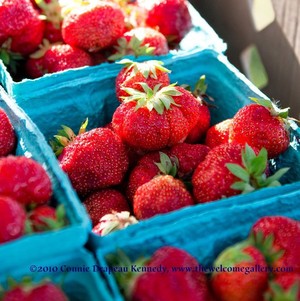14 Jul Tue 2015
Mid-Size Farm Visit - Freitas Farm in Middleboro
Visiting conventionally farmed Freitas Farm in Middleboro last week was invigorating with much anticipation for the goods to come this season. Scott Freitas is now training the 5th generation about farming, teaching his young children the methods of strawberry picking. I got to taste one of the last of the season’s bounty, absolutely delicious. This farm is modeled for sales at farmers’ markets as the main source of income; their location is not inductive for a farm stand or on-farm sales. Every day is a market day for Freitas farm. We started the tour in front of the 3 greenhouses where the long rows of lettuces, squash, and tomato plants were tended to with drip irrigation. The jungle of tomato vines awaited the process of tying them up, a quick view in the greenhouse showed just how that was to be accomplished. There the baseball sized globes were glowing green and red all down each neatly tied row. To the sides were the raised boxes used for the carrots and beets over winter and in the next greenhouse over it was overflowing with nearly spent cucumber vines that had given hundreds of early spring cucumbers. Such bounty requires tremendous heat generation throughout the late winter months and early spring, accomplished by a wood furnace with underground pipes to transport the warm air to each greenhouse oasis. The third greenhouse was full of spring plants, flowers and hangers providing the first sales of the year. Taking a drive in the truck we visited the 9 different parcels totaling 60 acres with more than half of it under cultivation. We twisted through small wooded sections to find hidden fields tucked between the small hills. The fields had mixed varieties of vegetables succession planted to permit the best use of space and supply a continual flow of produce. The apple orchards, packed full with fruit, were being watered, and some late pruning was underway. In another field beans of 3 colors were being picked as were multiple types of summer squash over-filling boxes and buckets. On any given day there can be five to fifteen people working the fields and greenhouses. Some of the fields have no irrigation, others have heavy duty sprayers to quench the soil’s thirst much like a golf course is watered. The orchards have drip irrigation to assure proper watering of the mature trees. The variety was amazing from 7 varieties of apples to watermelon, from beets and three color of beans to multiple types of zucchini and summer squashes. There are raspberries, cherries, wine berries, pears and peaches too. Sweet potatoes, carrots, onions and cucumbers were almost as abundant as the many fields of corn. In one field the okra was blooming with its happy creamy and black faced flowers and the row next to it the okra was ready to pick, the bounty was almost as large as the plant itself. Another small field already had Sungold cherry tomatoes yielding in small quantity, sweet and juicy as always. The farm uses non-GMO seed primarily from one supplier and has been growing most of the same varieties for several generations; proven varieties that the farm can count on producing well. Most planting is done with a large pull behind seeder, creating straight rows with evenly spaced plants. Deer are prevalent, however the mixed rows and multiple plantings in large quantity provide for some anticipated sharing of the bounty. On the wish list of things awaiting time and capital investment are heavy pruning and netting for the blueberry fields and to replant the cranberry fields. Although small harvests are still possible both need some overhaul to get the yield needed to be profitable with those crops. There is just so much a farmer can get accomplished each year. Last year's project was the addition of cold storage, a root cellar, permitting overwintering of potatoes as seed potatoes for this year.
Lorrie
12:40 PM EDT

